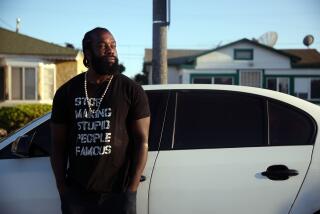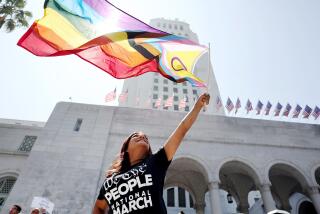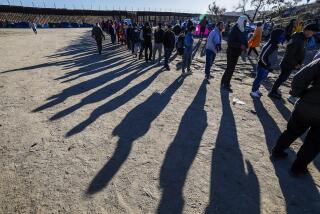Poll: Voters mostly approve of police, but views split along racial lines
A solid majority of California voters believes local police have a tough job and do it well, but nearly a third say law enforcement targets minorities unfairly, according to a new USC Dornsife/Los Angeles Times poll.
The survey found attitudes toward police split along racial and ethnic lines: Blacks, Latinos and Asians were substantially more likely than whites to say that police are too aggressive or treat whites better than others.
The contrasting views reflect persistent tension between law enforcement and minority communities in California — even decades after police clashes with African Americans sparked the 1965 and 1992 riots in Los Angeles.
Black voters, the poll found, were consistently most critical of police, followed by Latinos and Asians, while whites had the most favorable views of law enforcement. Two-thirds of blacks said it was true that police target minorities unfairly; less than a quarter of whites agreed.
Poll respondent Ralph Berry, an African American who lives in Bellflower, said in a follow-up interview that young black men were especially susceptible to unwarranted scrutiny by police. Typical, he said, was the time years ago when an officer followed him around the block and checked his plates as he searched for a parking spot in downtown Long Beach.
“You’re looked at as suspect, regardless of where you’re at or what you’re doing,” said Berry, now 55. “It’s automatically assumed the worst.”
John Bridges, a 22-year-old white Marine who grew up outside Modesto and now lives at Camp Pendleton, said he believes police treat every group the same.
“I’ve never had a bad experience with cops,” Bridges said.
The survey came weeks after the fatal police shooting of black teenager Michael Brown in Ferguson, Mo., triggered protests and civil rights investigations by the U.S. Justice Department. The use of heavy military equipment by the mostly white police force in confronting protesters in the predominantly black suburb of St. Louis has drawn widespread condemnation.
In South Los Angeles, the fatal police shooting last month of Ezell Ford Jr., a 25-year-old black man, has threatened to erode the credibility and goodwill that the LAPD has worked hard to build over the last decade. On Friday, the shooting of Ford was a key focus of an NAACP conference on police brutality in Exposition Park.
Despite its evidence of lingering concerns, the poll showed that police overall are popular in an era marked by steadily declining crime and efforts by police agencies to engage with communities disproportionately affected by crime.
Overall, 82% of California voters agreed that local police have a tough job and for the most part do it well. Yet even on that question, there was at least some racial divide: 88% of whites thought it was true, while 74% of blacks, 71% of Latinos and 73% of Asians agreed.
There also was a divergence of views on the question of engagement, a major focus for police in Los Angeles and other cities. Among whites, 81% agreed that police were willing to engage, but only 55% of blacks, 68% of Latinos and 69% of Asians agreed.
A bigger split emerged over the statement that local police were ineffective, too slow to respond to calls and nowhere to be found in an emergency. Nearly half of African Americans agreed, while 40% of Latinos, 24% of Asians and 18% of whites thought it was true.
Historian Josh Sides, author of “L.A. City Limits: African American Los Angeles from the Great Depression to the Present,” said the fact that even more blacks didn’t see police as ineffective showed progress in easing friction between police and that community.
“I can say unequivocally there’s been a significant improvement in police relations with African Americans,” he said.
Nonetheless, 42% of black voters said that local police were too aggressive and more of a threat to people than anything else; 28% of Latinos, 21% of Asians and 11% of whites agreed.
Most of the time, however, Californians were describing aggression that occurred at some remove.
Overall, the poll found 14% of California voters recalled an occasion in the last year when they felt police treated them unfairly; for blacks, it was 26%; Latinos, 20%; whites, 12%; and Asians, 11%. But nearly two-thirds of Californians knew of a case somewhere in the United States of police treating people unfairly.
California voters also were divided on whether police were tougher on blacks, Latinos, Asians or whites, or treated all groups equally. Overall, 40% said police treated everyone the same, 33% said they were tougher on blacks, and 10% said they were tougher on Latinos. (Almost no one felt police were tougher on whites or Asians.)
But substantial shares of whites, blacks and Asians agreed that if any group was unfairly targeted, it was blacks: 33% of whites thought so, as did 61% of blacks and 51% of Asians.
Latinos were divided, with 28% saying police were tougher on them, 24% saying they were tougher on blacks, and 34% saying they treat all groups the same. Just 19% of blacks believed police treated everyone the same, with 31% of Asians and 44% of whites agreeing.
Poll respondent Antonio Sosa of Mar Vista, a 48-year-old digital marketing executive, said his interactions with police on the Westside were all positive, but that racial profiling was clearly a nationwide problem.
“There’s an assumption of guilt or nefarious intention simply by the color of their skin, or the address where people live,” he said.
But Jennifer Valladao of Union City in the Bay Area, a white 30-year-old research associate for a pharmaceutical company, said racial profiling was limited to “a few bad apples,” and was not a systemic problem that police need to fix.
“A lot of it comes down to how you carry yourself,” she said. “If you treat them with respect, they’ll treat you with respect. If you start acting shifty around a police officer, they’re going to take notice.”
The survey of 1,507 registered California voters on behalf of USC’s Dornsife College of Letters, Arts and Sciences and The Times was conducted by telephone from Sept. 2 through 8. The margin of error for the poll — conducted by the Democratic group Greenberg Quinlan Rosner Research and American Viewpoint, a Republican firm — is plus or minus 2.9 percentage points overall and larger for all subgroups.
[email protected]
Twitter: @finneganLAT
More to Read
Sign up for Essential California
The most important California stories and recommendations in your inbox every morning.
You may occasionally receive promotional content from the Los Angeles Times.











